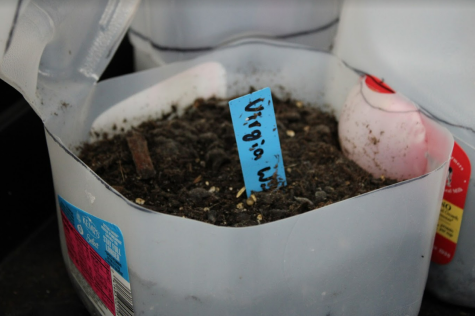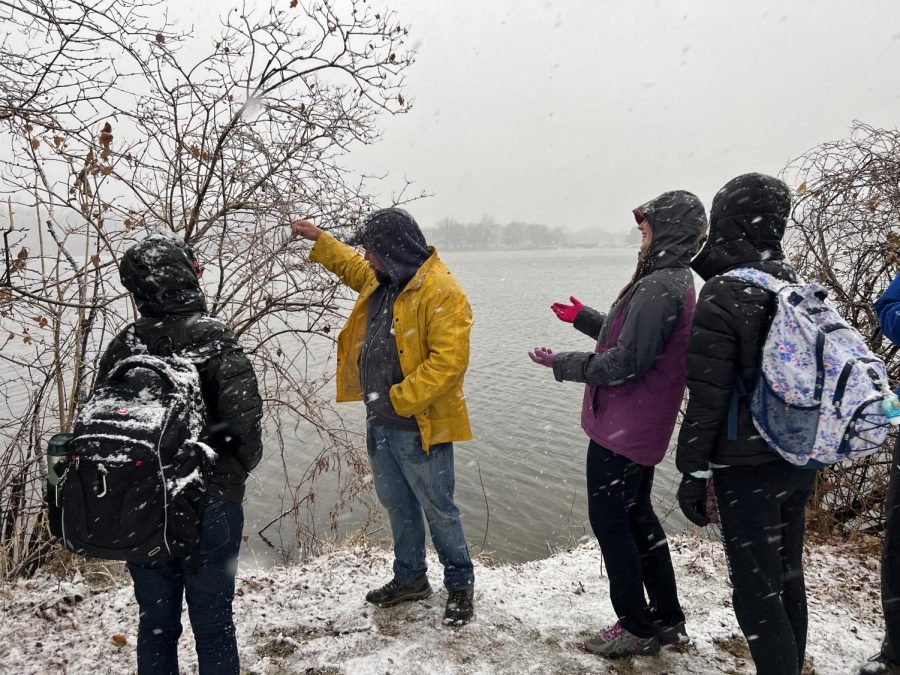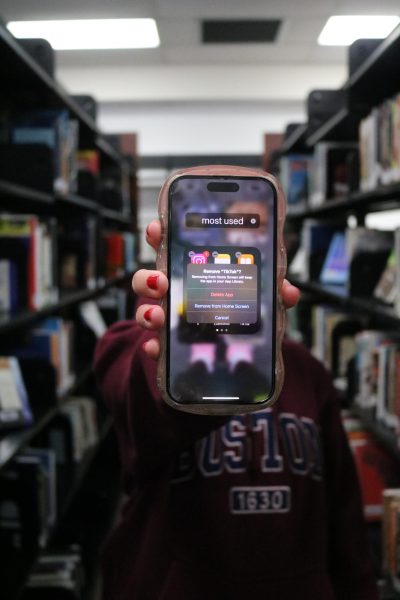ECOS begins the Butler Lake restoration project
ECOS co-presidents Finley Roman and Atalhea Herman learn about invasive plants surrounding Butler Lake from an environmental conservationist. The Butler Lake restoration began on Jan. 21 in hopes to solve the erosion problem.
On Saturday Jan. 21, LHS ECOS, a club dedicated to invoking thoughts on ecosystems and sustainability, began a restoration of Butler Lake since the lake’s outer edge is eroding, if left unaddressed, the school is in danger of losing a portion of their practice field.
In 2015, the Ecological Services Branch of Lake County Health Department released a Butler Lake report that contained a map of erosion along the southern edge of the lake near the football practice field. After reading this report, ECOS further investigated the land around the lake and found several invasive plants infesting the lake’s outer edge. This is causing further erosion to the degree that LHS is in danger of losing a corner of the athletic practice field. Invasive plant roots do not run deep in the ground, and therefore cannot hold the shoreline like native plants with deep roots can.
Therefore, this year, the main focus for ECOS is the lake restoration project. Every year, ECOS chooses a new focus that relates to helping the environment. Last year, they chose to focus on solar energy when they added solar panels to power the fountain in the courtyard. This project served as an example, for how the entire school could eventually switch to solar energy.
ECOS club resident Finley Roman saw several benefits in beginning this project.
“One reason why we chose this project was we are a new club and we want to help establish ourselves in the greater community, as well as bring attention to environmental actions that both the school and the wider community can take,” Roman explained.
In August and September of this year, after reading the Butler Lake report and exploring the lake themselves, ILM Management cleared the invasive plants surrounding the lake, free of charge. ILM Management is an ecological services company that helps landowners address ecological problems on their property and works with the forest preserves and other nonprofits. Their contribution to the project allows for ECOS to plant new plants in the summer.

ECOS has been preparing a variety of plants to soon inhabit the land along the rim of the lake. They are currently growing around 1,000 plants through cold stratification, the process of germinating plants through refrigeration. Another estimated 3,000 are being grown indoors in plastic milk jugs that serve as mini greenhouses. The plants that are currently being grown indoors will be planted in August. The plants were chosen based on their ability to withstand any salt or soil that runs down from the parking lot into the lake, as well as full sunlight exposure.
ECOS even took into account the educational value new native wildlife could bring to the LHS classroom. ECOS selected plants that are safe to eat (along with those that are not) to enhance the foraging unit in the PE department’s Outdoor Education class.
ECOS has four main ecological goals for the Lake Restoration. The first is to replace all invasive plants with native plants that create a habitat for wildlife, specifically beneficial pollinators (such as butterflies) and birds.
The second goal is to reduce erosion on the shore. Although the project does not affect the shoreline itself, the plants selected to be planted along the shoreline are deeply rooted native plants that will assist in holding on to the soil and preventing erosion when waves hit, as opposed to invasive plants that have shallow roots and don’t help keep the soil intact.
The third goal is to plant beautiful plants that attract the attention of homeowners and entice them to plant their own. ECOS plans to install an informational sign with QR codes that contain information and details about individual plants.
“We wanted them to be able to go shopping along the shoreline,” explained Dr. Jennifer Kahn, ECOS sponsor and LHS science teacher.
The fourth goal is reduction of runoff and filtration of pollutants. When major rain events occur, pollutants like salt, sediment, and motor oil in the parking lot run down into the lake. The new plantings will serve as a buffer and absorb these pollutants.
The Butler Lake Restoration project will impact many members of the Libertyville community who use the lake recreationally, as well as some LHS students who use the lake and the surrounding area for their classes.
“In general, we would like to help educate the community about native plants and our environment and help people make an impact in their own life,” explained Atalhea Herman, the second president of ECOS club.
The restoration will have a major impact on not only the Libertyville community, but the state of Illinois as well.
“We’re hoping that [the project] will raise awareness about Illinois, what’s native here, and what can be beautiful here,” said Herman.




![Mr. Abullh Ali, manager/assistant, helps open Queen Yemeni Coffee in downtown Libertyville at 606 North Milwaukee Ave. With the help of employees such as manager and LHS senior Yousef Taha, they are able to bring the Yemeni and Ethiopian culture to Libertyville by using their Queen spices, cinnamon and cardamom in their drinks such as Adani Chai, which is inspired by Sheda, the Queen of Yemen and Ethiopia. “The history of our coffee [is] a long history and we believe that Yemen and Ethiopia started the coffee and we are bringing something unique to the community,” Mr. Ali said.](https://www.lhsdoi.com/wp-content/uploads/2025/04/Photo-1-600x400.jpg)



